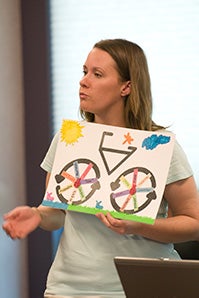There are many models, instruments, and published documents to assist faculty with evaluation and assessment:
During the semester
Use assignments and rubrics to assess student learning and to evaluate performance (class discussion, journals, analysis papers, or oral presentations).
End of semester

- Use final papers, presentations, and/or posters to evaluate student learning. Some faculty conduct structured “wrap-up” discussions using specific reflection questions to elicit critical thinking. Tip: for the final reflection, consider using the SL Exhibition poster template, then ask students to submit it to the SL Exhibition
- Ask agencies to comment on student performance, and/or on the overall partnership with your course. Invite agencies to attend any final presentations, then debrief with them afterward.
Other evaluation instruments
There are many models, instruments, and published documents to assist faculty in evaluating and assessing their teaching effectiveness.
CIRCLE’s civic engagement index
Additional Resources:
Two foundational resources continue to shape how scholars and practitioners assess learning outcomes in service-learning.
The Measure of Service-Learning: Research Scales to Assess Student Experiences by Bringle, Phillips, and Hudson (2004) offers a comprehensive collection of validated measurement instruments specifically designed for service-learning contexts. The book includes scales for constructs such as civic attitudes, moral development, interpersonal skills, and critical thinking. It also provides a concise introduction to measurement theory, making it especially valuable for instructors and researchers seeking rigor in their assessment strategies.
Assessing Service-Learning and Civic Engagement: Principles and Techniques is a Campus Compact toolkit by Gelmon, Holland, Driscoll, Spring, and Kerrigan (2001). This guide offers practical frameworks for assessing the impact of service-learning and civic engagement across four domains: students, faculty, community partners, and institutions. It includes sample indicators, data collection tools, and strategies that remain highly relevant for designing program-level assessments.
More recently, Clayton, Hess, and Donaldson (2023) published Assessment for Community Engagement: Strategies for Critical Design and Reflective Practice, which integrates design thinking, equity-minded assessment practices, and reflective tools rooted in the DEAL Model. This volume expands the field by combining critical reflection theory with participatory and developmental approaches to assessment.
Bringle, R. G., Phillips, M. A., & Hudson, M. (2004). The measure of service-learning: Research scales to assess student experiences. American Psychological Association.
Clayton, P. H., Hess, J., & Donaldson, K. (2023). Assessment for community engagement: Strategies for critical design and reflective practice. Stylus Publishing.
Gelmon, S. B., Holland, B. A., Driscoll, A., Spring, A., & Kerrigan, S. (2001). Assessing service-learning and civic engagement: Principles and techniques. Campus Compact.
The Boise State Service-Learning Office developed instruments to assess the effects on students, faculty and community partners. Please contact servicelearning@boisestate.edu for more details.